#ewastemanagement
Explore tagged Tumblr posts
Text

India's E-Waste Crisis: Act Now! ♻️
India’s e-waste is growing at an alarming rate of 20% annually, posing serious environmental and health risks. Proper disposal is the key to a sustainable future! ✅ Dispose of your old electronics responsibly with certified e-waste recyclers and contribute to a cleaner, greener planet. 🌱💻
0 notes
Text
Effective e-waste and plastic waste management is crucial for environmental sustainability, involving steps like recycling, public awareness, and supporting sustainable brands. Consumers can contribute by reducing, reusing, and recycling, and by making informed purchasing decisions.
#EWasteManagement#PlasticWaste#SustainableLiving#RecycleReduceReuse#EcoFriendly#EnvironmentalAwareness#GreenLiving#WasteReduction#ResponsibleConsumption#SaveThePlanet
0 notes
Text
The Future of India's EV Market: A Sustainable Path Forward
India is gearing up for a transformative shift in its automotive market, with electric vehicles (EVs) expected to account for more than 40% of the market by 2030. This ambitious goal, projected to generate over $100 billion in revenue, highlights the urgent need for robust recycling and e-waste management systems.
According to Harry Bajaj, CEO of Mobec Innovation, the focus should be on increasing recycling rates, conserving natural resources, decreasing greenhouse gas emissions, and promoting sustainable consumption. The government's supportive policies and incentives, such as subsidies and tax benefits, are driving this growth, alongside private sector innovations.
However, to fully realize the benefits of EVs, significant investment in renewable energy sources for charging stations is crucial. Standardizing components like batteries and charging connectors will further bolster the industry’s growth, ensuring seamless integration and operation.
The rise of EVs also presents an opportunity to develop efficient recycling processes. This will not only conserve resources but also support the circular economy and reduce environmental impact. As the EV market expands, addressing these challenges is essential to ensure sustainable and responsible growth.
India’s journey towards a sustainable future is well underway, with the EV market leading the charge. By focusing on innovation, infrastructure, and sustainability, India can set an example for the world and pave the way for a greener, cleaner future.
Read more here: https://smefutures.com/indias-investment-landscape-2024-a-deep-dive-into-a-transformed-market/
#IndiaEVMarket#SustainableFuture#ElectricVehicles#EVGrowth#GreenEnergy#Recycling#EwasteManagement#RenewableEnergy#EVInfrastructure#CircularEconomy#SustainableConsumption#Innovation#ClimateChange#GreenMobility#EVRevolution#FutureOfTransport#MobecInnovation#CleanEnergy#GovernmentPolicies#PrivateSectorInnovation
0 notes
Text

Give your gadgets a proper send-off. Recycle your e-waste and let's power up a cleaner planet.
For more info:
#reduce reuse recycle#garbage#segregation#pondicherrylovers#pondicherry#pondicherrymunicipality#recycling#solid waste management#ewastemanagement#ewaste
0 notes
Text
Revolutionizing Environmental Conservation: by WasteMaterial

Understanding the E-Waste Crisis
E-waste refers to discarded electronic devices, including computers, mobile phones, televisions, and appliances. According to recent studies, the world produces millions of tons of e-waste annually, and this number is only expected to increase. Improper disposal of e-waste poses serious environmental and health hazards, as it contains toxic substances such as lead, mercury, and cadmium. These pollutants can contaminate soil, water, and air, leading to detrimental effects on ecosystems and human health.
Introducing WasteMaterial’s E-Waste Project
WasteMaterial recognizes the urgency of addressing the e-waste crisis and has launched the E Waste Project as a proactive solution. This initiative encompasses a multifaceted approach to e-waste management, focusing on recycling, education, and sustainable practices.
1. Recycling Infrastructure
At the core of the E Waste Project is the establishment of comprehensive recycling infrastructure. WasteMaterial has invested in state-of-the-art facilities equipped with advanced technology for the safe dismantling and recycling of electronic devices. Through partnerships with certified recycling centers, WasteMaterial ensures that e-waste is processed responsibly, minimizing environmental impact and maximizing resource recovery.
2. Community Engagement
Education and awareness play a crucial role in combating e-waste. WasteMaterial collaborates with local communities to raise awareness about the importance of proper e-waste disposal and recycling. Educational campaigns, workshops, and outreach programs are organized to inform individuals about the environmental consequences of e-waste and encourage responsible consumer behavior.
3. Sustainable Innovation
Innovation lies at the heart of WasteMaterial’s approach to sustainability. The company continuously explores new technologies and methodologies to improve e-waste management practices. From eco-friendly packaging materials to energy-efficient production processes, WasteMaterial integrates sustainability into every aspect of its operations, setting a precedent for responsible corporate stewardship.
4. Circular Economy Initiatives
The E Waste Project is aligned with the principles of the circular economy, which aims to minimize waste and maximize resource efficiency. WasteMaterial promotes the concept of product lifecycle extension through repair, refurbishment, and reuse initiatives. By extending the lifespan of electronic devices, the company reduces the need for new production and mitigates the environmental impact of e-waste generation.
5. Global Collaboration
Addressing the e-waste crisis requires a coordinated effort on a global scale. WasteMaterial actively engages in partnerships and collaborations with international organizations, government agencies, and industry stakeholders to exchange best practices, advocate for policy reforms, and drive collective action against e-waste proliferation. By fostering collaboration and knowledge sharing, WasteMaterial seeks to amplify the impact of its E-Waste Project worldwide.
Conclusion: A Sustainable Future
The E Waste Project by WasteMaterial represents a bold step towards a more sustainable future. By tackling the e-waste crisis head-on through recycling, education, innovation, and collaboration, WasteMaterial is leading the way in environmental conservation. Together, we can transform the challenges of e-waste into opportunities for positive change, ensuring a cleaner, healthier planet for generations to come. Join us in our mission to make a difference — one electronic device at a time.
1 note
·
View note
Text
Revolutionizing E-Waste Management in India: Spotlight on WasteMaterial
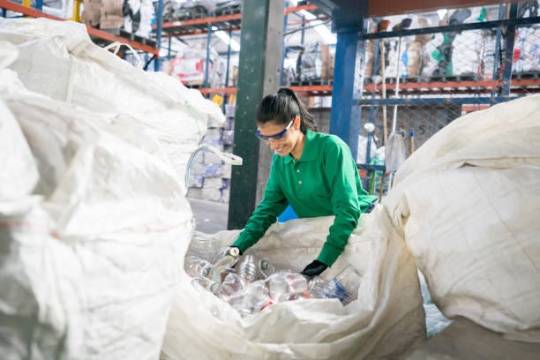
Understanding the E-Waste Conundrum in India
India stands at the cusp of a digital revolution, with a burgeoning consumer base embracing the latest gadgets and gizmos. However, this surge in technology adoption comes with a hidden cost — the generation of vast quantities of electronic waste. According to recent studies, India generates approximately 2 million tons of E-Waste Management companies in India annually, a figure expected to escalate rapidly in the coming years.
The disposal of e-waste poses a myriad of challenges, ranging from environmental pollution to public health hazards. Improper handling of electronic waste releases toxic substances such as lead, mercury, and cadmium into the soil and water bodies, contaminating the environment and endangering human health. Moreover, the rampant practice of informal recycling in unregulated scrapyards exacerbates these issues, exposing vulnerable communities to hazardous working conditions and health risks.
Enter WasteMaterial: Pioneering Sustainable Solutions
Amidst this grim scenario, WasteMaterial emerges as a trailblazer in the realm of E-Waste Management companies in India. Founded with a vision to create a sustainable future, WasteMaterial employs innovative technologies and best practices to tackle the e-waste epidemic head-on.
At the heart of WasteMaterial operations lies a commitment to responsible recycling. Unlike conventional methods that often prioritize profit over sustainability, WasteMaterial adopts a holistic approach that prioritizes environmental stewardship and social responsibility. Through a network of state-of-the-art recycling facilities, WasteMaterial ensures that end-of-life electronics are dismantled, processed, and recycled in an eco-friendly manner, minimizing harm to the environment and human health.
Key Initiatives and Impact
WasteMaterial’s impact extends far beyond the realms of environmental conservation. By championing the cause of E-Waste Management companies in India, the company catalyzes socio-economic development and empowers local communities.
One of WasteMaterial’s flagship initiatives is its focus on creating awareness and driving behavioral change. Through outreach programs and educational campaigns, WasteMaterial educates consumers and businesses about the importance of responsible e-waste disposal and the benefits of recycling. By fostering a culture of environmental consciousness, WasteMaterial strives to instill lasting change and pave the way for a sustainable future.
Furthermore, WasteMaterial is committed to fostering inclusive growth by providing livelihood opportunities to marginalized communities. Through its recycling facilities, the company creates jobs and empowers informal waste workers, offering them formal employment, training, and access to social benefits. By integrating inclusivity into its business model, WasteMaterial not only mitigates the adverse effects of e-waste but also contributes to poverty alleviation and social equity.
Looking Ahead: Towards a Greener Tomorrow
As India stands at a crossroads in its journey towards sustainable development, WasteMaterial serves as a beacon of hope, illuminating the path towards a greener, cleaner future. By leveraging technology, innovation, and a steadfast commitment to environmental stewardship, WasteMaterial redefines the landscape of E-Waste Management companies in India.
As we navigate the complexities of the 21st century, WasteMaterial reminds us that sustainability is not merely a choice but a collective responsibility. By joining hands with visionary organizations like WasteMaterial, we can pave the way for a future where prosperity is synonymous with environmental preservation, and progress is measured not only in economic terms but also in terms of social and environmental impact. Together, let us embark on this journey towards a brighter tomorrow, where waste is no longer a burden but a valuable resource, and where every action we take today shapes the world we leave for future generations.
#EWasteManagement#WasteMaterial#SustainableTech#GreenIndia#RecycleResponsibly#TechRecycling#EnvironmentalStewardship#SustainableDevelopment#EcoFriendly#GreenLiving
0 notes
Text
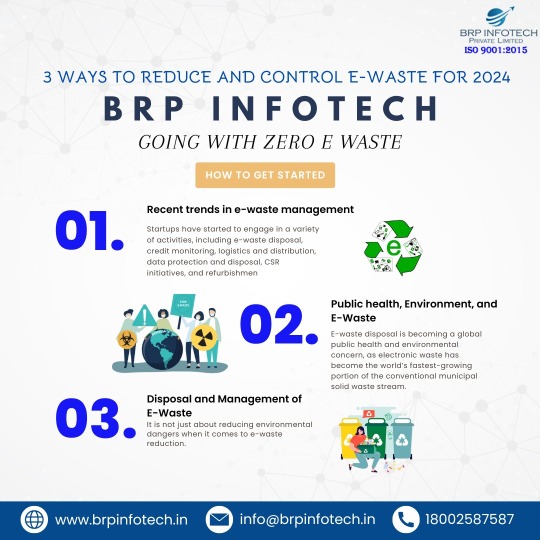
3 Ways to reduce and control e-waste for 2024.
#ewaste#zerowaste#ReduceWaste
0 notes
Text

You can turn the tide by choosing authorised recyclers like Namo eWaste, we can ensure our old gadgets get a responsible second life.
#NamoEcoCrusade#TechRecyclingHeroes#NamoeWaste#ewastemanagement#ewaste#environmentalsustainability#electronics#reusereducerecycle♻️#collectiondrive#recycle#zerowasteliving#zerowastelifestyle#zerowastetips#zerowastehome#zerowastecollective#zerowastefashion#recycledmaterials
0 notes
Text
Some thoughts on E-Waste Management in India
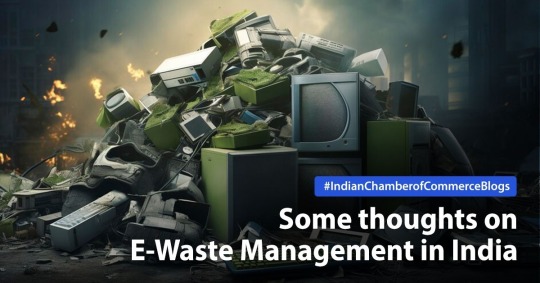
Waste , Electronic, Electrical and Technical devices need to be recycled properly, otherwise toxins are released into the soil, water, air and human tissue which raises the concentration of lead and other harmful compounds. Managing E-Waste in a eco-friendly way is a huge task considering the generation is as high as 40% of the new arrivals together with the accumulated lot and also expensive as the equipment for waste treatment plant, collection cost of E-waste, repairing and maintenance is costly. The primary step in reducing E-Waste is reducing E-consumption per se which is out of the race for the present day. Rapid product development and forced obsolescence are two key factors and this is encouraged by unbridled consumption of today. In 2023, the consumer electronics industry is expected to generate $75.77 bn in revenue with telephones occupying a share of 58% at $ 44.34 bn. And the craze for annual model change happens in phones. Globally, 53.6 MMT of electronic trash were produced in 2019 and the figure is expected to reach 74MMT by 2030, according to the Global E-Waste Monitor Report. India is he 3rd largest E-waste generator after China and the USA with 3.3 MMT E-Waste generation annually. India also faces the problem of importation/dumping from rich and industrialised countries. In India, E-Waste is covered by a number of environmental laws and rules, but penalties for non-compliance are insufficient and difficult to enforce which enhances the problem. The legislation in India dealing with E Waste is basically preventive and procedural in nature which does not provide any punitive measures for the manufacturer, importer, distributor and user of electronic device , as a result the violator continues to do so. This again is loaded further by electrical waste on all fronts.
In such a situation, we may recommend the following:
(a) Policy level interventions like creation of E-waste Regulation, Control of their Import and developing a process for item wise disposal/recycling. Ideally the process for disposal/recycling may be aligned to an institutional structure.
(b) Developing environmentally sound engineering methods for recycling , recovery and disposal with quality standards at each step.
(c) Align FDI and Private Investment in Solid Waste Management to E-Waste Management.
(d) Stringent monetary punishment for non-compliance with rewards for highlighting non-compliance.
What are your thoughts? Do share them with us
#IndianChamberofCommerceBlogs#sustainability#renewableenergy#environment#wastemanagement#ewaste#electronicwaste#electronical#ewastemanagement#ewasterecycle#Technicaldevices
0 notes
Text
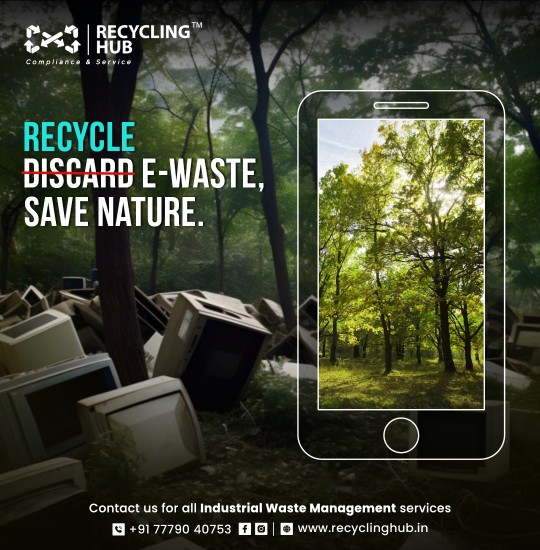
Discarding e-waste doesn't help our environment; recycling it does. So choose e-waste recycling company in India to save ourselves and our environment. After all, nature provides us with the boon of living.
#RecyclingHub#EWaste#EWasteRecycling#EWasteManagement#EWasteManagementCompany#GPCBauthorized#Ahmedabad
1 note
·
View note
Text
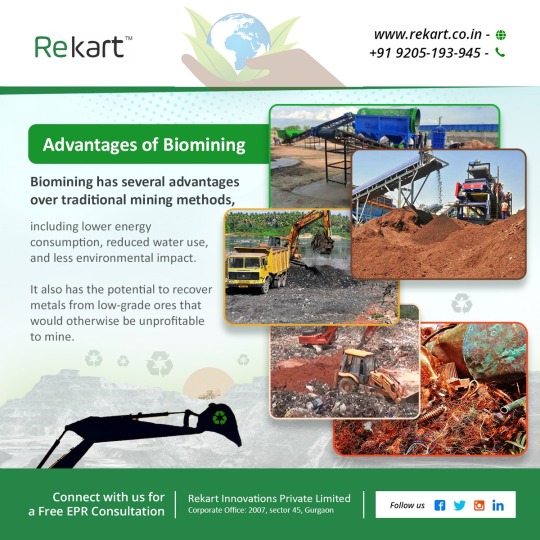
Biomining has several advantages over traditional mining methods, including lower energy consumption, reduced water use, and less environmental impact. It also has the potential to recover metals from low-grade ores that would otherwise be unprofitable to mine.
#ewasterecycling#developingworld#sustainableimpact#wastemanagement#recycling#renewables#ecofriendly#rekartone#ewastemanagement#ewaste#savetheplanet#reducewaste#recyclewaste#environment#biomining
0 notes
Text
Revolutionizing E-Waste Recycling: Introducing WasteMaterial
E Waste Recycling Companies
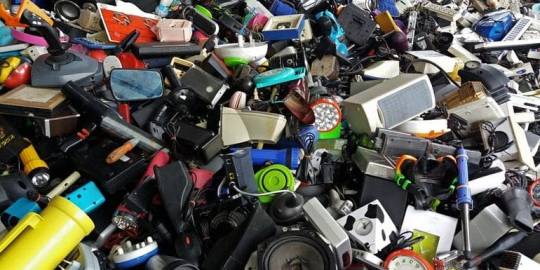
WasteMaterial: Leading the Charge in E-Waste Recycling
WasteMaterial is not just another E Waste Recycling Companies it is a pioneer in sustainable waste management solutions. Founded on the principles of environmental stewardship and technological innovation, WasteMaterial has emerged as a frontrunner in the industry, revolutionizing the way e-waste is handled and processed.
At the core of WasteMaterial’s operations is a commitment to maximizing resource recovery while minimizing environmental impact. Through state-of-the-art recycling facilities and cutting-edge technologies, WasteMaterial efficiently processes various forms of e-waste, including old computers, mobile phones, televisions, and other electronic devices.
Why Choose WasteMaterial?
Environmental Responsibility: WasteMaterial prioritizes environmental sustainability in every aspect of its operations. By recycling e-waste responsibly, WasteMaterial helps mitigate the environmental hazards associated with improper disposal, such as soil and water contamination and greenhouse gas emissions.
Advanced Recycling Technologies: WasteMaterial employs advanced recycling technologies to extract valuable materials from e-waste efficiently. Through processes like shredding, sorting, and refining, WasteMaterial can recover precious metals, plastics, and other valuable components, diverting them from landfills and reintroducing them into the production cycle.
Data Security: In an era where data privacy is paramount, WasteMaterial understands the importance of securely managing electronic devices. Whether it’s wiping sensitive data from hard drives or ensuring the safe disposal of electronic components, WasteMaterial prioritizes data security throughout the recycling process, giving clients peace of mind.
Compliance and Certifications: WasteMaterial adheres to strict regulatory standards and holds certifications that attest to its commitment to quality and compliance. By partnering with WasteMaterial, clients can rest assured that their e-waste is handled in accordance with the highest industry standards, minimizing legal and reputational risks.
The Future of E-Waste Recycling: A Circular Economy Approach
As the global demand for electronics continues to rise, the need for sustainable E Waste Recycling Companies solutions has never been more pressing. WasteMaterial recognizes that traditional linear models of consumption and disposal are no longer viable in the long term. Instead, WasteMaterial advocates for a circular economy approach, where resources are continuously recycled and reused, minimizing waste and maximizing value.
Through initiatives such as product refurbishment, component recovery, and material repurposing, WasteMaterial aims to close the loop on e-waste, creating a circular ecosystem where resources are conserved and waste is minimized. By adopting a holistic approach to E Waste Recycling Companies, WasteMaterial not only reduces the environmental footprint of electronic devices but also creates economic opportunities and fosters innovation in the recycling industry.
Join the Movement Towards Sustainable E-Waste Management
In conclusion, WasteMaterial stands at the forefront of the e-waste recycling revolution, offering comprehensive solutions that combine environmental responsibility, technological innovation, and regulatory compliance. As consumers, businesses, and governments increasingly prioritize sustainability, WasteMaterial provides a beacon of hope in the quest for a cleaner, greener future.
Together, let us embrace the challenge of E Waste Recycling Companies and pave the way for a more sustainable tomorrow. Join WasteMaterial in its mission to transform the e-waste landscape and build a world where waste is no longer seen as a problem but as a valuable resource waiting to be reclaimed.
#EWasteRecycling#SustainableTech#WasteMaterial#CircularEconomy#GreenTechnology#RecyclingInnovation#DataSecurity#EnvironmentalResponsibility#ElectronicWaste#RecyclingRevolution#SustainableFuture#TechRecycling#GreenBusiness#ResourceRecovery#EWasteManagement
0 notes
Text
Data Centers’ Role in E-Waste Management: Challenges and Opportunities
Explore data centers' role in e-waste management, addressing challenges and opportunities in sustainability, recycling practices, and reducing environmental impact. Nowadays IT and communication industries are using more and more electronic items for their growth in the sector. Consumers also started to discard some of the old electronic products quickly after the upgradation of new equipment. This is leading to e-waste in a larger quantity.
0 notes
Text

BRP INFOTECH cutting edge features propel e-waste management into the future!
0 notes
Text

Namo eWaste need systemic change, not just fancy market tricks. Let's invest in clean energy, ditch the old habits, and make our planet proud.
#NamoEcoCrusade#TechRecyclingHeroes#NamoeWaste#ewastemanagement#ewaste#environmentalsustainability#electronics#reusereducerecycle♻️#collectiondrive#recycle#zerowasteliving#zerowastelifestyle#zerowastetips#zerowastehome#zerowastecollective#zerowastefashion#recycledmaterials#emission
0 notes
Text

#EwasteRecycling#Techazar#ElectronicRecycling#SustainableTech#RecycleElectronics#GoGreen#ITAssetDisposal#EwasteManagement#DataSecurity#ReduceReuseRecycle#SafeDisposal#EcoFriendlyTech#EwasteSolutions#ElectronicWasteDisposal#ResponsibleRecycling#RecycleTech#DigitalCleanup#GreenElectronics#EcoConscious
0 notes